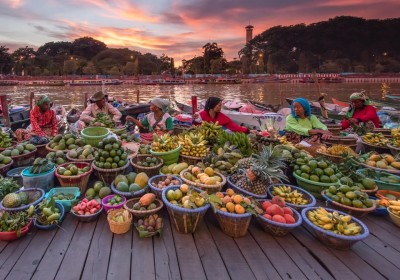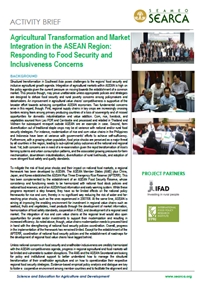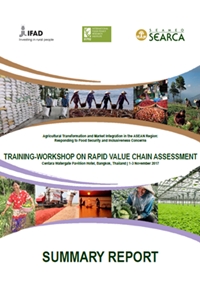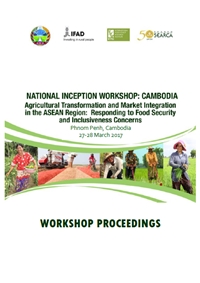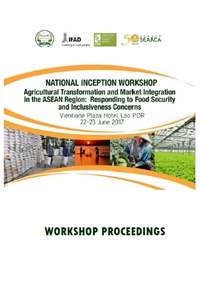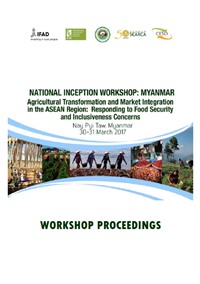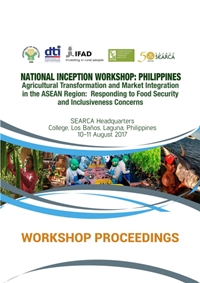Background
Structural transformation in Southeast Asia poses challenges to the regions' food security and inclusive agricultural growth agenda. Integration of agricultural markets within ASEAN is high on the policy agenda given the current pressure on moving towards the establishment of a common market. This process though, may prove unattainable unless appropriate policies and strategies are designed to defuse food security and rural poverty concerns among policymakers and stakeholders. An improvement in agricultural value chains' competitiveness is supportive of the broader effort towards achieving competitive ASEAN economies. Two fundamental concerns arise in this regard, though. First, regional supply chains in key crops are increasingly crossing borders raising fears among primary producing countries of a loss of sovereignty and of missed opportunities for domestic industrialization and value addition. Corn, rice, livestock, and vegetables sourced from Lao PDR and Cambodia and processed and retailed in Thailand and Vietnam for subsequent re-export outside ASEAN are an example in case. Second, farm diversification out of traditional staple crops may be at variance with national and/or rural food security strategies. For instance, modernization of rice and corn value chains in the Philippines and Indonesia have been at variance with governments' efforts to achieve self-sufficiency. Furthermore, with a growing urban population, food price shocks are perceived as a major threat by all countries in the region, leading to sub-optimal policy outcomes at the national and regional level. Yet, both concerns are in need of a re-examination given the rapid transformation of Asia's farming systems and urban consumption patterns, and the associated growing pressures for farm mechanization, downstream industrialization, diversification of rural livelihoods, and adoption of more stringent food safety and quality standards.
To mitigate the risk of food price shocks and their impact on national food markets, a regional framework has been developed by ASEAN. The ASEAN Member States (AMS) plus China, Japan, and Korea established the ASEAN Plus Three Emergency Rice Reserve (APTERR). This has been complemented by the establishment of an ASEAN Food Security Reserve, whose consistency and functioning needs to be harmonized with national food stock policies and national food reserves; and of an ASEAN food information and early warning system. While these programs represent a step forward, they have so far limited effects on the national policy frameworks for rice and corn, thereby in no significant way reducing the risk of wider and far-reaching price shocks, such as the ones experienced in 2007/08. At the same time, ASEAN is aiming at improving the enabling environment for investment in regional value chains such as seafood, fruits and vegetables, meat products through the development of market information, harmonization of food safety standards, cooperation in R&D, and development of a regional seed market. The integration of rice and corn value chains at the regional level would also open opportunities for private sector investments to support their modernization and resulting in increased efficiency. As noted above, though, value chains modernization needs to proceed hand in hand with the strengthening of national food security policies coordination. Overall, progress in the implementation of the framework has remained limited. Except for the establishment of the APTERR, coordination of national food security policies and the establishment of roadmaps for the development of regional food value chains have lagged behind.
Unless national concerns on food security and smallholder inclusiveness are credibly harmonized with the ASEAN competitiveness agenda, progress in regional agricultural and food markets will be limited and vulnerable to sudden disruptions. The AMS and the ASEAN Secretariat are looking for policy and institutional support to better understand how to manage the structural transformation of their smallholder agriculture and on how to operationalize their respective regional food security strategies. Evidence-based empirical policy analysis and dialogue are key to foster a cooperative environment among member countries and to facilitate the alignment and engagement of all relevant stakeholders from governments, civil society, research and academia, farmers’ associations, and the private sector. This process of confidence-building and enhanced cooperation will be of critical importance.
Based on a broader understanding of the regional agricultural transformation process, the proposed Program will assist in the preparation of national and regional roadmaps for the development of key regional food and agri-based value chains, developing mechanisms for improved coordination between national and ASEAN food reserves and food security policies, inform the process of harmonization of food safety and quality standards among AMS, and improve cooperation in R&D to improve practices in key agri-based and food value chains.
Titled Agricultural Transformation and Market Integration in the ASEAN Region: Responding to Food Security and Inclusiveness Concerns, the Program is funded by the International Fund for Agricultural Development (IFAD) and implemented by the International Food Policy Research Institute (IFPRI) as lead, and the Southeast Asian Regional Center for Graduate Study and Research in Agriculture (SEARCA) as partner.
Target Countries
All AMS with focus on Cambodia, Lao PDR, Myanmar, the Philippines, and Vietnam
Objectives
- To strengthen the capacity of the targeted AMS to develop policies and programs to support the adjustment of the smallholder farm sector to changes in sub-regional agricultural and food markets;
- To enhance the cooperation among the AMS in food security and agricultural development through the preparation of strategic programs and measures in the areas of R&D, food safety and quality standards, and investments in food and agri-based industries.
The expected outcomes will be (i) improved competitiveness of smallholders within the AMS in the production of key food and industrial crops, and (ii) reduced exposure of less developed AMS to food security shocks.
Broad Activities
Policy Studies and Expert Workshops: (1) Analysis of structural transformation of selected regional food and agri-based value chains, focusing on smallholders' competitiveness and their spatial, institutional, and technological reconfiguration resulting from increasing market integration within ASEAN; (2) Assessment of current national sectoral strategies in targeted AMS in relation to the structural adjustment of the farm sector, smallholders' competitiveness, and establishment of systems to meet the requirements of the ASEAN common market; (3) Review of regional cooperation initiatives (in R&D leading to improved practices in regional food and agri-based value chains, food safety and quality, environmental standards and their implication for the competitiveness of smallholders, coordination of national food reserves and food security policies, and agribusiness investment climate); and (4) Review of national (in the five targeted AMS) and regional strategies, policies, and institutions for the development of smallholder-inclusive major regional agri-based and food value chains.
High-Level Policy Forums and Roundtables: (1) Provide support to the policy dialogue towards the adoption of a shared vision and strategy on food security and agricultural competitiveness among AMS; and (2) Develop a roadmap for future programs at the national and ASEAN level with the objective of improving smallholder competitiveness, increase efficiency and value addition at the regional level, and foster food security.
Technical Assistance for Planning and Policy Development: (1) Assist the ASEAN Secretariat, the relevant ASEAN Technical Working Groups, and the relevant technical agencies in the targeted AMS governments in designing food security cooperation programs and regional value chain development strategies through regulations, policies, preparation of multi- stakeholder roadmaps, food security atlases/maps and other planning tools; and (2) Assist national agencies in the targeted AMS in updating national policy and planning frameworks to enhance coherence at regional level on food security and value chain development cooperation.
